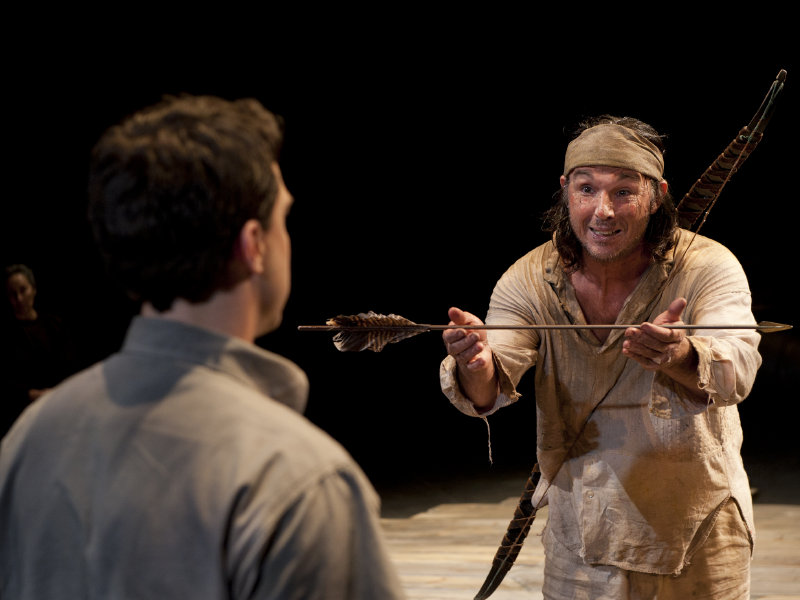SPRING GREEN -- If we were to play a word association game with state theater-goers and mentioned the American Players Theatre, it wouldn't take long for Shakespeare to pop up.
The APT was founded on mounting impeccably authentic and faithful-to-the-script productions of the Bard, and the stretch of the Wisconsin River that flows within a half mile of the company's wondrous woods will always have a touch of the Avon. Don't miss the APT's exceptional "As You Like It" this season.
But the company is also earning a reputation for finding and producing modern stage gems that are overlooked by most regional theaters. In the early part of its current season, the APT opened Lillian Hellman's "Another Part of the Forest," an engrossing family drama from 1946. The outdoor production is quite compelling
This month another piece of serious theater about familial issues, W. Somerset Maugham's "The Circle," made its open-air debut here. Indoors, in the year old Touchstone Theatre, South African playwright Athol Fugard's 2004 stage memoir "Exits and Entrances" is a wonderfully appropriate play for the APT to produce, because it eloquently and concisely speaks to what it means to live a creative life. The production is beautifully acted.
Adding "The Circle" and "Exits and Entrances" to the strong class of June openings here, 2010 ranks among the American Players Theatre's finest seasons.
Maugham is only a hazy British literary figure from a bygone era for most of us, but he was a popular and influential dramatist, novelist and short story writer, particularly in the 1920s and ‘30s. "The Circle" observes two generations of a wealthy English family's struggles with the tension between romantic love and faithful responsibility.
Clive Champion-Cheney's wife, Lady Kitty, ran off with his best friend, a British lord and rising politician. She left their young son Arnold behind.
English divorce laws blocked the lovebirds from legalizing their relationship, the promising political career was ruined, and the couple live in exile in Italy for 30 years before they show up at the Champion-Cheney estate, invited by Kitty's callow daughter-in-law.. The younger woman, Elizabeth, is thinking about emulating Kitty. Filled with a girlish fervor for romance, Elizabeth is tempted to flee a dull and passionless marriage for a union with a young man who flatters and pays attention to her.
"The Circle" offers the opportunity to closely analyze the "grass is always greener" syndrome in wedlock. Asked by her estranged husband to talk reality to the young woman, Kitty has a candid chat with Elizabeth, revealing the social and psychic price an early 20th century English woman paid for choosing to scuttle her marriage in favor of romance.
The play carefully builds to its climax -- Elizabeth's decision. Maugham included abundant humor in his piece, and he did not stack the deck for or against staying the course with a spouse.
Director James Bohnen and his superb cast honor that, maintaining a balance between the characters and keeping us in suspense until the drama's final moments. The young and conflicted Elizabeth is the pivotal role in the play, and Susan Shunk delivers her breakout APT performance portraying her.
Shunk's Elizabeth is likable and even sympathetic as she ponders breaking her marital vows. We are pulling for her to find happiness. But she is head over heels with an immature enthusiasm for infatuation, and we get the sense that if she weren't so gaga over the fellow named Teddy, she would be crazy for someone else.
Marcus Truschinski, who plays Teddy, and Shunk create one of those extended special moments we have come to expect from the APT once or twice a season. They express their attraction for each other, not in a hot and steamy embrace but with a gleeful exuberance that radiates youthful charm.
Lady Kitty was considered a great beauty when she deserted her family 30 years ago, and her decline is supposed to be evident when she returns to the Champion-Cheney manor. Tracy Michelle Arnold made an interesting choice in her portrayal of that.
Rather than display physical slippage, she gives us a character who has clearly undergone decay of the spirit. Kitty has become too loud, too flamboyant and too much of a party animal. We know she is covering something deep and damaging.
The beauty is still there, but it is now distorted by a cheap and gaudy gloss. That makes Lady Kitty a sharp contrast to the comfortable elegance Brian Mani brings to his portrait of her estranged husband, Clive. My bet is that Maugham would have strongly approved.
A different type of toll is often exacted on the lives of artists, the people who publicly express a creative spark in any medium. Frequently revealing themselves in depth and detail, they expend exhausting amounts of emotional energy in the search for honesty and truth.
That is what we take away from Fugard's "Exits and Entrances," a highly concentrated piece of poignant theater in a single, 80-minute act. The play is ostensibly a slice of Fugard's early theatrical life in the 1950s and early ‘60s, when his future as a writer was being formed. But it is so much more.
"Exits and Entrances" contains two characters. The Playwright, who doubles as narrator, was hired to play a tiny role and serve as backstage dresser-assistant to South African actor Andre Huguenet in a production of "Oedipus Rex." Huguenet, a larger-than-life leading man well known in his native country, mounted the production in 1956 to celebrate his 30th anniversary on the stage.
Conversations between The Playwright and Huguenet expose the famous actor's offstage alienation from his family and conventional society. His grand and dramatic persona masks loneliness, an empty private life and a sharply critical self-image.
But that bleakness is leavened with rewards for Huguenet. He has devoted his life to working with beauty and the greatest expressions of the human spirit. When inspiration called, he followed.
"Fan the flames of your purpose," he tells The Playwright. Huguenot and Fugard did.
It would be so easy to overplay these characters, who are so theatrical in nature. Under the direction of Kate Buckley,
Kenneth Albers and David Daniel keep the acting exquisitely under control.
Albers is appropriately florid as Huguenet. Always a powerful presence onstage, he shows vulnerability here by opening cracks in his blustery exterior, and that makes Albers achingly human.
Daniel achieves a simple naturalness in his portrayal of The Playwright. He softens the play, facilitating its accessibility and serving, as do we, as a sponge to soak up Huguenet's prickly wisdom.
The American Players Theatre has been a more than capable interpreter of the uneven works of George Bernard Shaw. Some of Shaw's plays are brilliant and others significantly suffer from his propensity to give his characters speeches rather than dialogue.
Shaw's ardent enthusiasm for what he had to say apparently caused him to overlook the need for theatricality. "Major Barbara" is certainly not the worst offender, but it challenges an audience's resolve to stay alert and engaged.
An all-star APT cast that includes James DeVita, Jonathan Smoots, Matt Schwader and Colleen Madden in the title role takes us over the peaks and into the valleys of Shaw's exploration of the effectiveness of public charity. It's a long trip.
The American Players Theatre is presenting eight shows in rotating repertory. The summer season concludes Oct. 17.
Damien has been around so long, he was at Summerfest the night George Carlin was arrested for speaking the seven dirty words you can't say on TV. He was also at the Uptown Theatre the night Bruce Springsteen's first Milwaukee concert was interrupted for three hours by a bomb scare. Damien was reviewing the concert for the Milwaukee Journal. He wrote for the Journal and Journal Sentinel for 37 years, the last 29 as theater critic.
During those years, Damien served two terms on the board of the American Theatre Critics Association, a term on the board of the association's foundation, and he studied the Latinization of American culture in a University of Southern California fellowship program. Damien also hosted his own arts radio program, "Milwaukee Presents with Damien Jaques," on WHAD for eight years.
Travel, books and, not surprisingly, theater top the list of Damien's interests. A news junkie, he is particularly plugged into politics and international affairs, but he also closely follows the Brewers, Packers and Marquette baskeball. Damien lives downtown, within easy walking distance of most of the theaters he attends.







